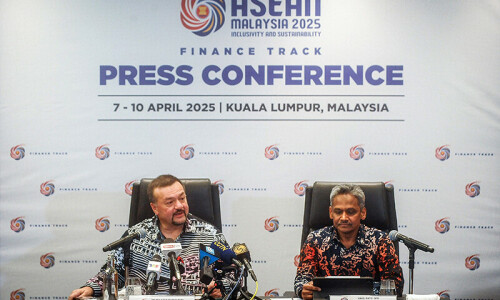“ONLY a crisis — actual or perceived — produces real change. When that crisis occurs, the actions that are taken depend on the ideas that are lying around,” said Milton Friedman, highlighting the power of crises.
Pakistan is experiencing its worst crisis since independence, with its 24th IMF programme underway and its people facing all kinds of ills. The recent budget has exacerbated the situation, burdening the salaried class. Clearly, past strategies have failed, and the country needs fresh, proven ideas to move forward. This article explores several such ideas that have been discussed but not yet implemented in Pakistan, starting with a cautious and well-executed demonetisation of the highest currency note.
Demonetisation has been a topic of discussion for some time but its potential benefits are often overlooked. It can combat black money, reduce cash dependency, and in some cases, control inflation — all critical issues for Pakistan. However, it has faced resistance due to Pakistan’s heavy reliance on cash, low financial inclusion, large informal economy and concerns over India’s experience, where a similar move temporarily slowed the economy. But Pakistan’s experience could differ from India’s for several reasons.
Unlike India’s demonetisation of 500- and 1,000-rupee notes, which accounted for 86 per cent of cash in circulation, Pakistan’s highest denomination note likely constitutes a smaller percentage of cash flow (exact figures were unavailable). Moreover, studies show that India’s challenges were largely due to poor planning and execution. Pakistan can learn to avoid similar pitfalls by meticulous planning and implementation.
Additionally, while India aimed to curb terror financing among other objectives, Pakistan’s primary and only goal should be to bring unaccounted cash into the formal economy. Demonetisation will make it challenging to conduct large cash transactions, forcing money into the system and making it difficult to overlook tons of taxable income. However, demonetisation alone won’t suffice; it must be preceded by a strong push towards digitalisation.
The country needs fresh, proven ideas to move forward.
Pakistan has made commendable strides in its digital payments with RTGS, Raast, and e-wallets. However, with at least 70pc of the population lacking access to financial services, this progress must accelerate (in 2021, 77.5pc of India’s population had access to accounts, compared to Pakistan’s 21pc). A policy worth emulating is India’s Pradhan Mantri Jan Dhan Yojana, which increased financial inclusion from half the population to 80pc within three years. Its key features included providing every household with at least one basic banking account, promoting financial literacy, direct benefit transfer, zero balance accounts, and debit cards with life insurance.
Studies show that in India, financial inclusion positively impacted economic growth, supported by demonetisation. For instance, a large-scale causality study confirmed that pre-demonetisation, economic activity stimulated banking usage, but post-demonetisation, this relationship reversed, with increased banking transactions driving economic growth.
Critics also argue that demonetisation failed in India because 99pc of currency was eventually returned; however, they overlook that it significantly bolstered the Unified Payments Interface, a revolutionary system in India’s digital payment space. In 2022 alone, UPI processed over $1 trillion in transactions, equivalent to a third of India’s GDP. Carefully planned de-monetisation combined with a well-designed financial inclusion programme will similarly boost economic growth in Pa-kistan.
Lastly, devolution is crucial for progress. True development lies within the third tier of government. While the NFC has benefited provinces, it’s time to reform the country’s Provincial Finance Commissions. All provinces have PFCs and distribute resources to local government (LG) based on criteria such as population, area, and specific needs; but their effectiveness varies widely and remains questionable.
This is different from India’s State Finance Commissions, constitutionally mandated under Article 243-I and required to be constituted every five years to review financial position of LGs. This is not to say India’s approach is without flaws; it spends only 3pc of state funding compared to China’s 51pc in its last tier. However, increased spending is a step that follows constitutional mandates, providing a framework for accountability and assessments. As Friedman continued, “That, I believe, is our basic function: to develop alternatives to existing policies, to keep them alive and available until the politically impossible becomes politically inevitable.” Until politically impossible becomes politically inevitable…
The writer is co-author of Development Pathways: India, Pakistan, Bangladesh 1947-2022.
Published in Dawn, August 10th, 2024













































